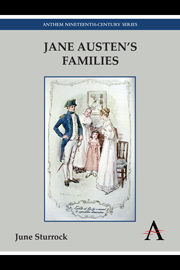Book contents
- Frontmatter
- Table of Contents
- Acknowledgements
- References and Abbreviations
- General Introduction
- Part I Family Dynamics
- Part II Fathers and Daughters
- Introduction
- Chapter Four Money, Morals and Mansfield Park
- Chapter Five Speech and Silence in Emma
- Chapter Six Dandies and Beauties: The Issue of Good Looks in Persuasion
- Conclusion: “Creative Attention”
- Notes
- Select Bibliography
- Index
Chapter Four - Money, Morals and Mansfield Park
from Part II - Fathers and Daughters
- Frontmatter
- Table of Contents
- Acknowledgements
- References and Abbreviations
- General Introduction
- Part I Family Dynamics
- Part II Fathers and Daughters
- Introduction
- Chapter Four Money, Morals and Mansfield Park
- Chapter Five Speech and Silence in Emma
- Chapter Six Dandies and Beauties: The Issue of Good Looks in Persuasion
- Conclusion: “Creative Attention”
- Notes
- Select Bibliography
- Index
Summary
Even more than Jane Austen's other novels, Mansfield Park hinges from beginning to end on the relations between the different generations of one family. Its first pages give the marital arrangements of the parents of the central characters; its last pages establish a new order of relations between parents and children, and hint at a future generation at Mansfield Parsonage. Virtually every one of these intergenerational relationships is harmful in one way or another. Sir Thomas Bertram unintentionally alienates his children and Lady Bertram neglects them. Mrs Norris merely flatters and indulges them. Mrs Rushworth's blind worship of that “very stupid fellow,” her son, does nothing to increase his capacities (68). Henry Crawford is corrupted by his uncle, the Admiral, and Mary Crawford is coarsened by the Admiral's unhappy and mercenary wife. Susan Price is embittered and Betsy Price spoilt by their mother's unfair treatment of them.
As for Fanny Price, the novel's heroine, she has an over-abundance of parent-figures and is mistreated to varying degrees by all of them. Her mother and father are indifferent to her, her uncle terrifies her, her aunt Bertram exploits her, while literally every speech that Mrs Norris addresses to or at Fanny inflicts some wound, major or minor. Fanny's “creepmouse” (166) qualities and her almost crippling desire to oblige and to be useful clearly result from this combination of coldness and perpetual harassment.
- Type
- Chapter
- Information
- Jane Austen's Families , pp. 71 - 84Publisher: Anthem PressPrint publication year: 2013



